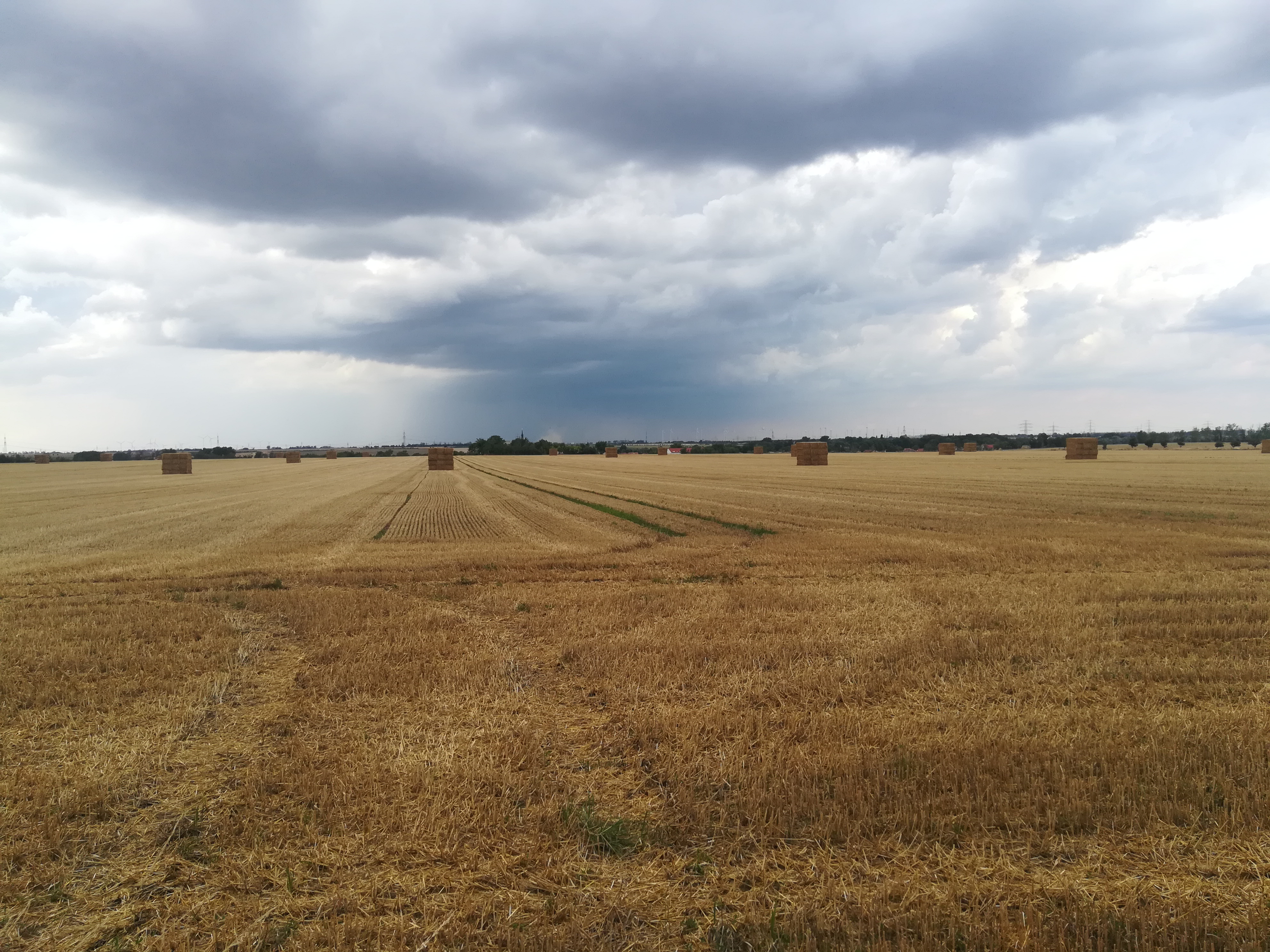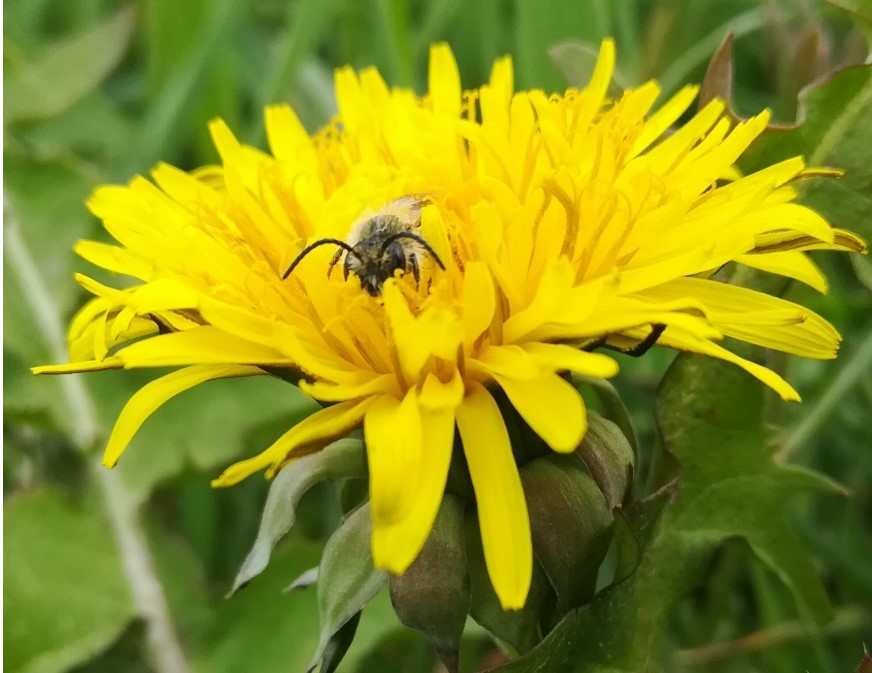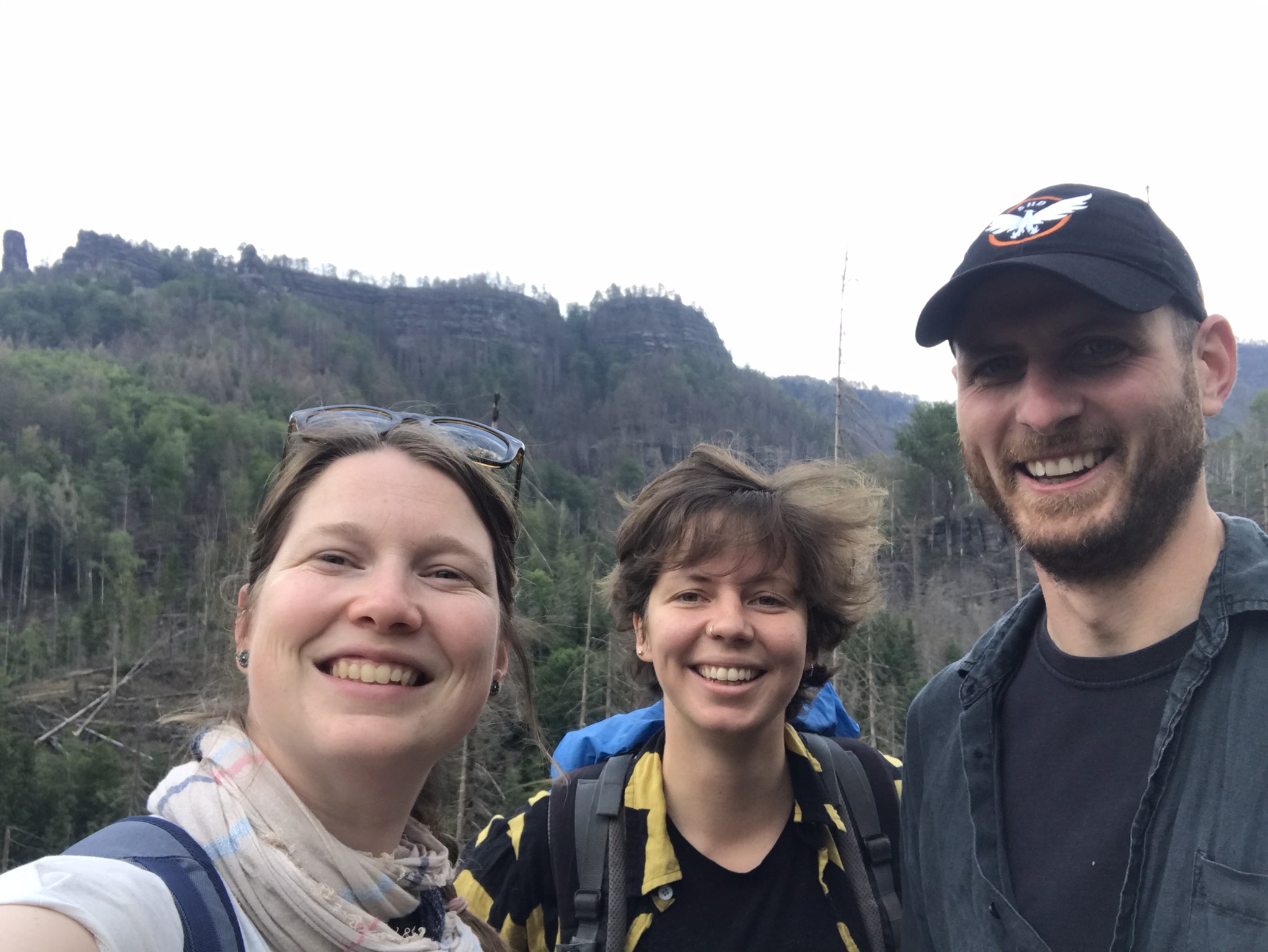
Interactions of Farmland Biodiversity and Agricultural Ecosystem Services under Climate Change (INTERCEDE)
INTERCEDE is a PhD cohort consisting of 3 projects, which aim is to take an interdisciplinary approach to understand, analyze and model agricultural landscapes in Central Germany. The PhD students are supported by a consortium of researchers at post-doc level as supervisors and of experienced senior scientists as university supervisors.
Project context
Agricultural management and conservation goals often are entangled through complex multidimensional and multi-scale trade-offs, resulting from varying landscape heterogeneity levels. Simplified landscapes caused by agricultural intensification often have severe negative ecological consequences. At the same time, climate change creates risks for agriculture, e.g. through extreme weather events (droughts) or pest outbreaks. In addition, other socio-economic factors such as changes in farmers motivations and management practices make these trade-offs shift.
One important way to remedy these destabilizing and reinforcing feedbacks are agri-environmental measures, e.g. through including cover crops, reduced tillage and structural elements. Whether these measures are also able to exert benefits for farmland biodiversity at local scales (e.g. through improved arthropod health or diversity) remains largely unanswered. Furthermore, it is an open question whether and how the ecologically beneficial effects of these measures translate to the landscape scale and how incentive structures should be changed in order to facilitate beneficial diversification and provide leverage points for a transformation to sustainable agriculture.
INTERCEDE will address the impacts of increasing landscape homogenization (reduced landscape heterogeneity, removal of remnant semi-natural vegetation) and crop specialization on farmland biodiversity and agricultural yields. Both aspects are expected to become more relevant with climate change and resulting pressures on agriculture (drought, extreme events). To address our central aim to understand agricultural landscapes as social-ecological systems, we have designed three interdisciplinary PhD projects:


Research context: Processes that are relevant for management and conservation often play out at large scales (e.g. hectares or decades). However, measurements are typically conducted at smaller scales (e.g. m² or years), especially at the level of individual species (Leibold & Chase 2018). Developing theoretical tools that connect scales at which data are collected with scales that are relevant for planning and management is therefore of utmost importance, especially for predicting future system behavior in response to novel conditions. For example, small-scale measurements suggest that high-intensity monocultures maximize agricultural yields and profits, but country-level yields are more stable when crop diversity is high (Renard & Tilman 2019). Similarly, although recent studies have identified dramatic declines in insect abundance, it is not clear how geographically widespread these declines are, nor what their long-term consequences will be (Hallmann et al. 2017).
Key questions: The goal of this INTERCEDE PhD project is to design new methods for linking small-scale observations to large-scale predictions. This thesis will address three questions:
(1) How can we make detailed, system-specific models more broadly generalizable?
(2) What predictions can we make about multifunctional landscapes using available data?
(3) How can we apply these models/predictions to inform landscape management issues, e.g. to provide high, stable yields, and to maintain diverse assemblages of species?
PhD student: Dorian Nothaaß
Supervisors: Adam T. Clark, Franziska Taubert, Andreas Huth, Stan Harpole



Research context: Landscape heterogeneity can substantially promote arthropod biodiversity. While a more diverse landscape composition (i.e. proportion of land-use types) generally enhances the diversity of natural enemies and pollinators, few studies have investigated the effects of landscape configuration (spatial arrangement of land-use patches) and crop diversity on arthropod biodiversity. In addition, land-use intensity (i.e. pesticide application) can negatively affect the health and diversity of arthropods, albeit quantitative land-management data are difficult to obtain and thus often not investigated.
Here, I focus on a mechanistic understanding of pathways impacting the diversity and health of beneficial arthropods, using gut microbiome as a proxy for organism health. Although gut microbiome analyses of the managed honeybee have received increased attention in the recent years, little is known about the health of wild bees and other arthropod taxa
Key questions: The purpose of this interdisciplinary PhD project is to better understand how the health and diversity of beneficial arthropods are affected by landscape heterogeneity and land-use intensity. This thesis will address three questions:
(1) What are the spatio-temporal effects of landscape heterogeneity and land-use intensity on wild bee communities?(2) Can heterogeneous landscapes mitigate the effects of pesticide use and pathogens on the health of beneficial arthropods?
(3) Can we identify recommendations for the enhancement and incorporation of insect-related ecosystem services at the landscape scale into agricultural landscapes?
PhD student: Jonna M. Heuschele
Supervisors: Christophe Dominik, Maria Felipe-Lucia, Tesfaye Wubet, Josef Settele
Master student: Stefanie Burger - “Matching scale and action: Farmer participation in agri-environmental schemes for promoting insects in agricultural landscapes”


.jpg)
Research context: Simplified, monoculture-based agriculture has severe negative ecological consequences. In addition, it makes farms vulnerable to external shocks such as extreme weather events, pest outbreaks etc., usually tackled by means of even higher external inputs, e.g. pesticides applications, thus reinforcing the negative impacts on the environment. These risks are likely to become more severe due to climate change.
Different agri-environmental measures can be put in place in order to enhance ecological intensification (e.g. through natural pest control) and thus to reduce external inputs, or to provide environmental public benefits (e.g. higher water quality). However, it is an open question whether and how the ecologically beneficial effects of agri-environmental measures translate to the landscape scale and how incentive structures should be changed in order to facilitate beneficial management of agricultural landscapes.
Key questions: The goal of this INTERCEDE PhD project is to explore and plan agricultural landscapes that minimize trade-offs or maximize synergies between agricultural ecosystem services. This thesis will address three questions:
(1) What is the importance of landscape and local level measures in modelling natural pest control?
(2) Which combinations of agri-environmental measures lead to optimal levels of multifunctionality at the landscape scale? And how do these optimally managed landscapes and actual landscapes differ?
(3) How can incentive structures be changed to move the socio-ecological system closer to the optimum?
Methods:
• Ecological and biophysical modelling
• Multi-objective optimization
• Socio-economic analysis
PhD student: Marta Bonato
Supervisors: Michael Strauch, Bartosz Bartkwoski, Anna Cord

Outcomes/Publications
- Nothaaß, D., Huth, A. (2025) Community recomposition caused by species extinction in the colonization-competition trade-off model for vegetation. Ecological Modelling, 499:110906, (Link)
- Burger, S., Heuschele, J. M., Felipe-Lucìa, M. R., Kernecker, M. L. (2023) Turning the wheel: Matching policies and sources of farmer behavior. In book of abstract: 52 Annual Meeting of the Ecological Society of Germany, Austria and Switzerland (GfÖ), 12-16 September 2023 | Leipzig, Germany
- Heuschele, J. M., Dominik, C., Ul Haq, H., Dunker, S., Felipe-Lucìa, M. R., Leyrer, D., Burger, S., Paxton, R., Schweiger, O., Settele, J., Wubet, T. (2023). Effects of pesticide exposure in agricultural landscapes on the gut microbiome of Bombus terrestris. In book of abstract: 52 Annual Meeting of the Ecological Society of Germany, Austria and Switzerland (GfÖ), 12-16 September 2023 | Leipzig, Germany
- Bonato, M. Cord, A.F., Bartkwoski, B., Strauch, M. (2023). Agricultural landscape redesign: identifying sustainable spatial allocation for agri-environmental practices. In book of abstracts: 52 Annual Meeting of the Ecological Society of Germany, Austria and Switzerland (GfÖ), 12 - 16 September 2023 | Leipzig, Germany
- Bonato, M., Martin, E.A., Cord, A.F., Seppelt, R., Beckmann, M., Strauch, M. (2023). Moving towards reliable generic landscape-scale models of natural pest control: considering associations between crops, pests and biocontrol agents is important. In book of abstracts: 52 Annual Meeting of the Ecological Society of Germany, Austria and Switzerland (GfÖ), 12 - 16 September 2023 | Leipzig, Germany
- Bonato, M., Cord, A.F., Bartkowski, B., Strauch, M. (2023). Using models and multi-objective optimization tools to guide the transformation toward more sustainable agricultural systems. In Book of abstracts: ECEM 2023, 4-8 September 2023 | Leipzig, Germany (Link)
- Nothaaß, D., Taubert, F., Huth, A., Clark, A. T. (2023) Modelling species invasion using a metapopulation model with variable mortality and stochastic birth-death processes. Ecological Modelling, 481:110372, (Link)
- Bonato, M., Martin, E. A., Cord, A. F., Seppelt, R., Beckmann, M., Strauch, M. (2023) Applying generic landscape-scale models of natural pest control to real data: Associations between crops, pests and biocontrol agents make the difference. In Agriculture, Ecosystems and Environment, 324. (Link)
- Heuschele, J. M., Schweiger, O., Felipe-Lucìa, M. R., Liu, Y., Settele, J., Dominik, C. (2022). Spatio-temporal effects of landscape heterogeneity on plant-pollinator interactions. In Book of abstracts: Joint Meeting SFE² GfÖ EEF 2022, 21-25 November 2022 | Metz, France (Link)
- Nothaaß D., Taubert F., Huth A., Clark A. T., (2022) Modelling species invasion using a metapopulation model with variable mortality and stochastic birth-death processes. In Book of abstract: iDiv Annual Conference 2022, online conference | 25-26 April 2022 (Link)
- Bonato M., Bartkwoski B., Beckmann, M., Cord, A., Seppelt, R., Strauch, M., (2021). Understanding the effects of landscape complexity on natural pest control: potential and limitations of applying generic models to local case studies. In Book of abstract: Landscape 2021, online conference | 20-22 September 2021 (Link)
Events
14 December 2020: Kick-off meeting
Keynote Promoting functional agrobiodiversity for sustainable agriculture. (Speaker: Prof. Dr. Catrin Westphal, University of Göttingen)
Keynote Let’s do both land sharing and sparing, or even better: Revise the narratives in the food security debate. (Speaker: Prof. Dr. Ralf Seppelt, UFZ CLE)
12 October 2022: Stand at UFZ Science Days
8 November 2022: Cohort presentation at IP1/TB1 PhD Day
14 - 17 June 2023: Writing retreat

Contact
Coordinators:
Dr. Michael Beckmann
michael.beckmann@ufz.de
Dr. Christophe Dominik
christophe.dominik@ufz.de
